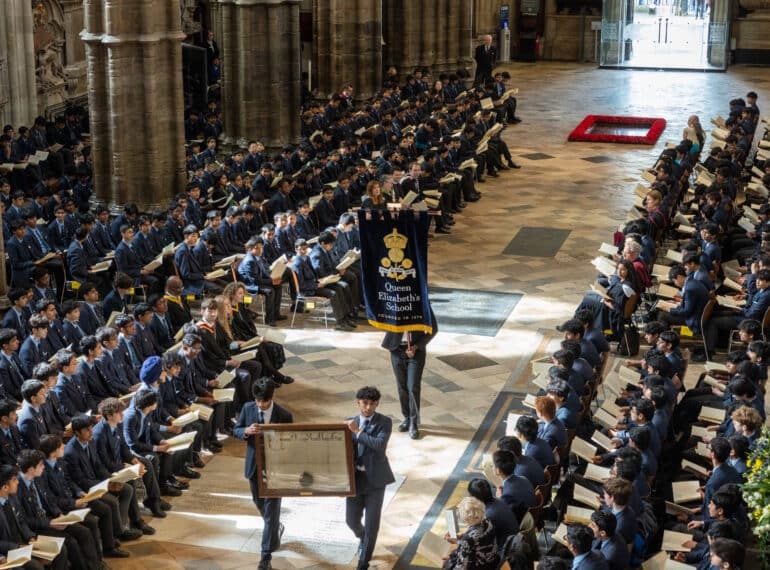
Four hundred and fifty years to the day since Queen Elizabeth I granted the Charter for the establishment of Queen Elizabeth’s School in Barnet, the Elizabethan community gathered in Westminster Abbey to celebrate in a special service of thanksgiving.
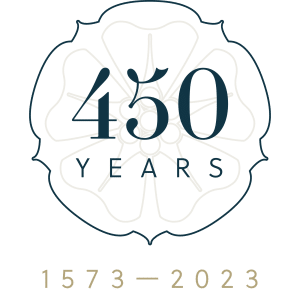 Featuring elements ancient and modern, today’s service reflected the past, present and future of a school that has in recent years risen to a place of high national repute.
Featuring elements ancient and modern, today’s service reflected the past, present and future of a school that has in recent years risen to a place of high national repute.
All 1,295 pupils attended, together with almost all staff, as well as governors, Directors of the Friends of Queen Elizabeth’s, Foundation Trustees, former staff, Old Elizabethans and around 300 current parents – a congregation of some 1,800 people.
Carried into the abbey were the Royal Charter itself, granted by Elizabeth I on 24th March 1573, and a banner that was presented to the School by HRH Prince Richard, The Duke of Gloucester, during his visit in November 2022.
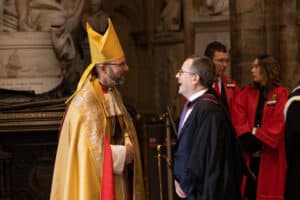 The service included religious and literary readings, with Year 11 pupil Rohan Kumar’s winning entry in the School’s 450th Anniversary Poetry Competition, and music from every century of the School’s existence, culminating in a premiere performance of an anthem commissioned from internationally renowned composer Howard Goodall.
The service included religious and literary readings, with Year 11 pupil Rohan Kumar’s winning entry in the School’s 450th Anniversary Poetry Competition, and music from every century of the School’s existence, culminating in a premiere performance of an anthem commissioned from internationally renowned composer Howard Goodall.
In his address, Neil Enright, 40th Headmaster of the School, said: “Today, we gather in this sacred and magnificent place to celebrate our School’s foundation. The place where our founder, Queen Elizabeth I, was crowned and is buried – a place of national celebration and commemoration. But, also, a place which inspires us to reflect upon our foundations, as much as our founding.”
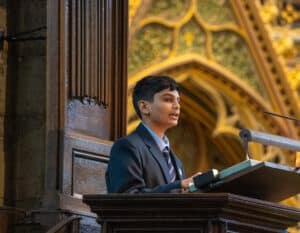 Drawing an analogy with Jesus’s parable of the foolish man who built a house on the sand and the wise man who built his house on the rock, Mr Enright said: “There have been many times over the past 450 years when the rain descended and the floods came and the wind blew and the School’s foundations were tested.”
Drawing an analogy with Jesus’s parable of the foolish man who built a house on the sand and the wise man who built his house on the rock, Mr Enright said: “There have been many times over the past 450 years when the rain descended and the floods came and the wind blew and the School’s foundations were tested.”
These storms included an outbreak of plague in 1603, when the School was said to have grown ‘sick in decay’, the imprisonment and even execution of governors for their support of the Crown during the English Civil War, straitened financial circumstances in the 18th century, the bombing of the School by the Luftwaffe in the Second World War, and the School’s decline in the 1970s and early 1980s, which saw it earmarked for closure by the local authority.
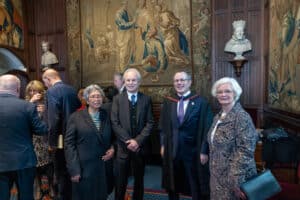 “Over the past 450 years, our remarkable school has often flourished, and always survived,” said Mr Enright.
“Over the past 450 years, our remarkable school has often flourished, and always survived,” said Mr Enright.
“Our challenge is to ensure, in a world of shifting sands, where the rain will again descend, and the floods will come and the wind will blow and beat down upon us, that we will not fall. That we will stand firm on our foundations and draw strength from our roots, spread deep and wide, and meet the bold assertion of our Charter that we will be: ‘one Common Grammar School in or near the town of Barnet… for the education, bringing up and instruction of boys and youth…… and the same to continue forever’.”
The service covered four broad themes of: foundations; challenges; service to others and hope for the future.
It was conducted by The Right Reverend Anthony Ball, Canon in Residence, and sung by QE’s Chamber Choir, with guest singers from the staff, Old Elizabethans, and St Albans High School for Girls, all conducted by Director of Music Ruth Partington. The School Orchestra was conducted by Caroline Grint, QE’s Assistant Director of Music, and the organ played by Mr Peter Holder, Sub-Organist.
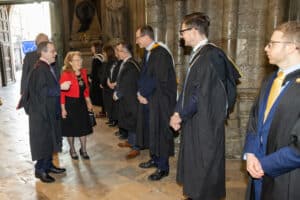 Before the service, the congregation listened to the orchestra’s performance of William Walton’s Crown Imperial and the Indian Ensemble’s performance of Tani Avartaram.
Before the service, the congregation listened to the orchestra’s performance of William Walton’s Crown Imperial and the Indian Ensemble’s performance of Tani Avartaram.
Among the guests were the headteachers of many partner schools, together with councillors, former Mayors of Barnet, and other supporters of the School.
The VIP party included: The Worshipful the Mayor of the London Borough of Barnet, Cllr Alison Moore; The Deputy Mayor of the London Borough of Barnet, Cllr Nagus Narenthira; Representative for The Lord Lieutenant of Greater London, Vice Lord-Lieutenant Colonel Jane Davis OBE QVRM TD DL; and The Lord Mayor of Westminster, Cllr Hamza Taouzzale.
After the first hymn, Helen Edmunds, Head of History, read from the Charter. Other readings were given by pupils of all ages, including 2023 School Captain Darren Lee, who is in Year 12.
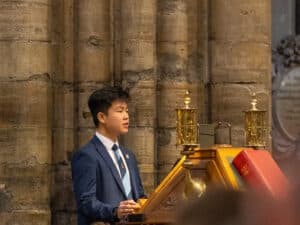 The Headmaster said the traditional Founder’s Day prayer, while others leading in prayer included Mrs Emi Aghdiran, Governor and Director of FQE, and Matthew Rose (OE 2002–09), Head of External Relations.
The Headmaster said the traditional Founder’s Day prayer, while others leading in prayer included Mrs Emi Aghdiran, Governor and Director of FQE, and Matthew Rose (OE 2002–09), Head of External Relations.
Years 7–10 had travelled to the abbey by coach; Years 11–13 came on the tube. The Headmaster led them all in an act of rededication to the School’s mission, with each of the six Houses invited to respond, in turn, with “Adsumus” (We are present).
Before the final blessing and procession, the Chamber Choir gave the first-ever performance of the new anthem commissioned by QE, which has as its refrain:
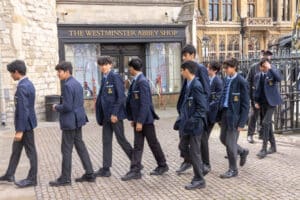 That like an oak, it draws its strength
That like an oak, it draws its strength
From ancient roots spread deep and wide.
From ancient roots
From ancient roots
From ancient roots spread deep and wide.
As the congregation departed to enjoy refreshments together, the bells of the abbey rang out.
- To view the order of service, which includes the full lyrics to Howard Goodall’s new anthem and Rohan Kumar’s competition-winning poem, click here.
- For more photos from before and after the service, click on the thumbnail images below.
- For more 450th anniversary news, click here.

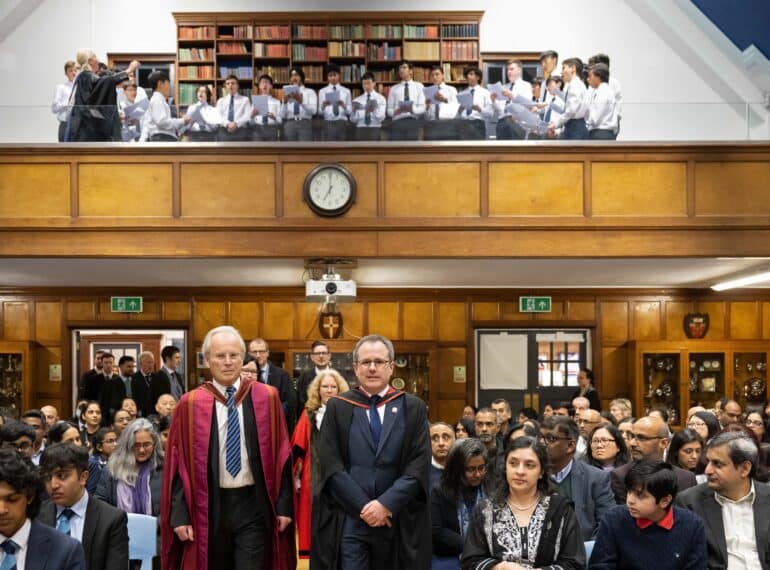
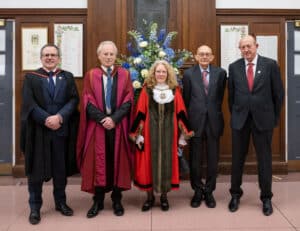 Current Headmaster Neil Enright said it was entirely appropriate that, as QE prepares to celebrate its 450th anniversary tomorrow, the place of honour should go to one of the School’s own. Dr Marincowitz was Mr Enright’s predecessor, holding the role from 1999 until his retirement in 2011.
Current Headmaster Neil Enright said it was entirely appropriate that, as QE prepares to celebrate its 450th anniversary tomorrow, the place of honour should go to one of the School’s own. Dr Marincowitz was Mr Enright’s predecessor, holding the role from 1999 until his retirement in 2011.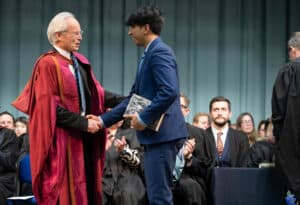 Dr Marincowitz, who first arrived at QE to join the History department in 1985, then presented prizes – which this year included copies of his book – to scores of prizewinners drawn from Years 10, 11 and 12. There were awards for all the academic subjects, for overall academic excellence, for contribution & responsibility and for outstanding performance or contribution in extra-curricular activities such as debating & public speaking, chess, drama and the Combined Cadet Force.
Dr Marincowitz, who first arrived at QE to join the History department in 1985, then presented prizes – which this year included copies of his book – to scores of prizewinners drawn from Years 10, 11 and 12. There were awards for all the academic subjects, for overall academic excellence, for contribution & responsibility and for outstanding performance or contribution in extra-curricular activities such as debating & public speaking, chess, drama and the Combined Cadet Force.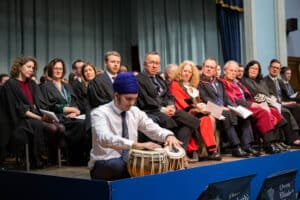 There were the customary musical interludes at the Senior Awards Ceremony, featuring performances by Music prizewinners. The interludes were: 20th-century French composer Paule Maurice’s Tableaux de Provence, performed by Year 10 saxophonist, Leo Sellis; Beethoven’s Romanze, played by violinist Jason Tao, of Year 11, and Rupak Kaida, performed by Year 12 pupil Isher Jagdev, on the tabla.
There were the customary musical interludes at the Senior Awards Ceremony, featuring performances by Music prizewinners. The interludes were: 20th-century French composer Paule Maurice’s Tableaux de Provence, performed by Year 10 saxophonist, Leo Sellis; Beethoven’s Romanze, played by violinist Jason Tao, of Year 11, and Rupak Kaida, performed by Year 12 pupil Isher Jagdev, on the tabla.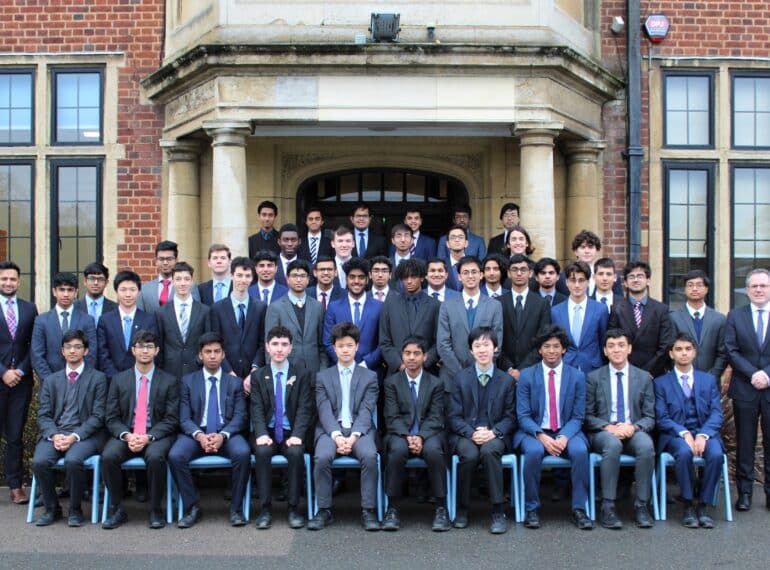
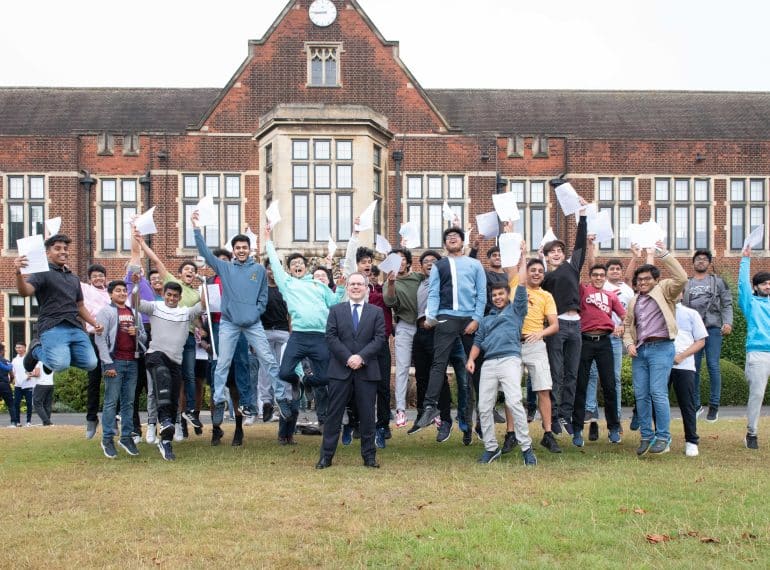
 Headmaster Neil Enright said: “This confirmation of our record-breaking A-level performance caps a fantastic year for QE. The achievement is all the more remarkable since this year’s leavers were disrupted throughout their time in the Sixth Form by the pandemic: my congratulations once again go to them – and to our staff – for showing such flexibility, hard work and fortitude in the face of repeated national lockdowns.
Headmaster Neil Enright said: “This confirmation of our record-breaking A-level performance caps a fantastic year for QE. The achievement is all the more remarkable since this year’s leavers were disrupted throughout their time in the Sixth Form by the pandemic: my congratulations once again go to them – and to our staff – for showing such flexibility, hard work and fortitude in the face of repeated national lockdowns.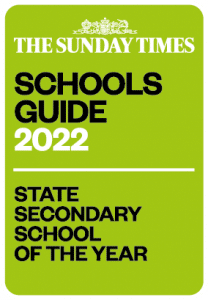 “2022 has also seen: the opening of our fantastic new Music building (The Friends’ Recital Hall and Music Rooms); the securing of 35 places at Oxford and Cambridge; the publication of an Ofsted report which found QE to be ‘outstanding’ across all areas, and this month’s royal visit by HRH The Duke of Gloucester. It has truly been Queen Elizabeth’s School’s annus mirabilis!
“2022 has also seen: the opening of our fantastic new Music building (The Friends’ Recital Hall and Music Rooms); the securing of 35 places at Oxford and Cambridge; the publication of an Ofsted report which found QE to be ‘outstanding’ across all areas, and this month’s royal visit by HRH The Duke of Gloucester. It has truly been Queen Elizabeth’s School’s annus mirabilis!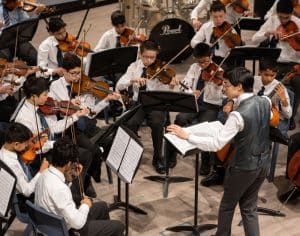 The upper reaches of this year’s Parent Power state school table are dominated by grammar schools, with the top 28 schools all fully selective – a fact expounded by the Parent Power editor, Helen Davies.
The upper reaches of this year’s Parent Power state school table are dominated by grammar schools, with the top 28 schools all fully selective – a fact expounded by the Parent Power editor, Helen Davies.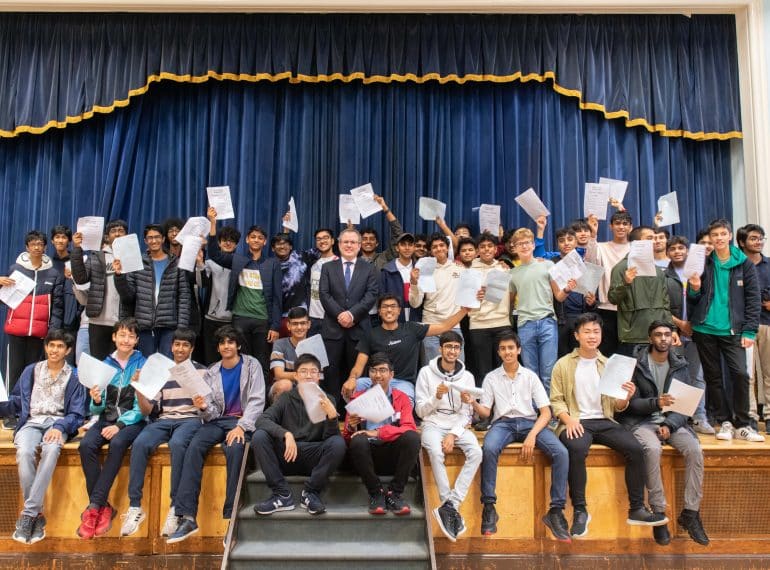
 In fact, the results at the highest grades are not only stronger than for the last pre-pandemic GCSEs in 2019, but also surpass last year, when the Government brought in a system of Teacher Assessed Grades.
In fact, the results at the highest grades are not only stronger than for the last pre-pandemic GCSEs in 2019, but also surpass last year, when the Government brought in a system of Teacher Assessed Grades. “These pupils had to cope with home-learning, close-contact isolation, stringent health & safety measures and frequently changing routines. Yet their results indicate that while the methods used by them and their teachers were somewhat different from normal years, they have delivered on their potential. They worked diligently and with dedication, were always mature about the challenges, and were enthusiastic about embracing all the opportunities available to them, both within and beyond the classroom.
“These pupils had to cope with home-learning, close-contact isolation, stringent health & safety measures and frequently changing routines. Yet their results indicate that while the methods used by them and their teachers were somewhat different from normal years, they have delivered on their potential. They worked diligently and with dedication, were always mature about the challenges, and were enthusiastic about embracing all the opportunities available to them, both within and beyond the classroom. Among the key highlights of today’s GCSE results at QE are:
Among the key highlights of today’s GCSE results at QE are: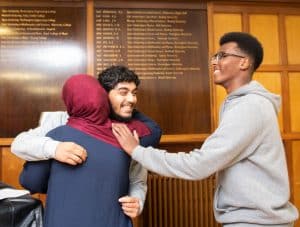 Mr Enright added: “Looking back, necessary though the lockdowns and pandemic restrictions were, we can now see that they gave staff, pupils and parents alike a fresh appreciation of the benefits of on-site learning. Happily, things here have since rebounded as strongly as ever, with these pupils, and the School as a whole, able to look forward with optimism to what comes next.”
Mr Enright added: “Looking back, necessary though the lockdowns and pandemic restrictions were, we can now see that they gave staff, pupils and parents alike a fresh appreciation of the benefits of on-site learning. Happily, things here have since rebounded as strongly as ever, with these pupils, and the School as a whole, able to look forward with optimism to what comes next.” Not only are the results better than in the past two years, when no examinations were taken and figures were based on assessments, but they are also up on the last pre-pandemic year of 2019.
Not only are the results better than in the past two years, when no examinations were taken and figures were based on assessments, but they are also up on the last pre-pandemic year of 2019. “The return of public exams has given the boys the opportunity to clearly demonstrate the fruits of their continued hard work and focus during the challenges of the pandemic, and their strong motivation to push forwards.
“The return of public exams has given the boys the opportunity to clearly demonstrate the fruits of their continued hard work and focus during the challenges of the pandemic, and their strong motivation to push forwards. A* grades amount to 69.9% of all results – up 10.4% on 2021 (when there were Teacher Assessed Grades or TAGs), and up from 45.3% in 2019; *
A* grades amount to 69.9% of all results – up 10.4% on 2021 (when there were Teacher Assessed Grades or TAGs), and up from 45.3% in 2019; * Mr Enright said: “As the Ofsted report helpfully pointed out, at QE, we are resolutely determined to keep up the momentum with further improvements. It’s not just about academic results – important though these are – but about achieving our mission to develop fully-rounded young men ready to make a positive impact in a fast-changing world.
Mr Enright said: “As the Ofsted report helpfully pointed out, at QE, we are resolutely determined to keep up the momentum with further improvements. It’s not just about academic results – important though these are – but about achieving our mission to develop fully-rounded young men ready to make a positive impact in a fast-changing world.